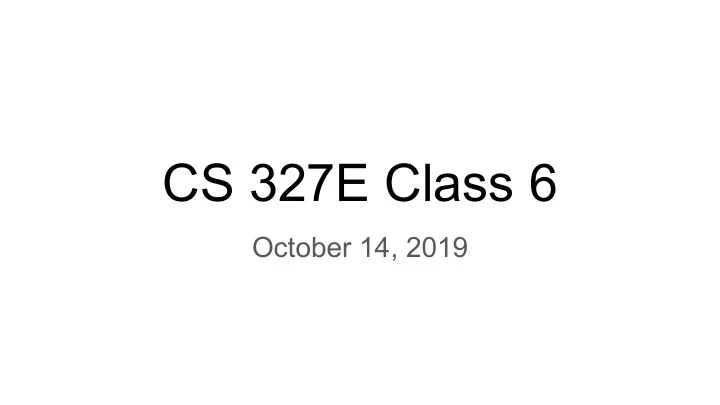

CS 327E Class 6 October 14, 2019
1) PTransforms such as Pardo mutate their input elements. A. True B. False
2) What kind of object does the ParDo transform expect? A. A DoFn subclass B. A DoFn super class C. A DoFn abstract class
3) Does ParDo support random access to PCollection elements? For example, is the highlighted code allowed? class ComputeWordLengthFn (beam . DoFn): A. Yes def process (self, element): B. No element0 = words[0] if len(element0) >= len(element): return [element0] word_lengths = words | beam . ParDo(ComputeWordLengthFn())
4) ParDo resembles which SQL operation? A. FROM clause B. WHERE clause C. ORDER BY clause D. JOIN clause
5) CoGroupByKey resembles which SQL operation? A. FROM clause B. WHERE clause C. ORDER BY clause D. JOIN clause
Recall: ParDo Transform ● Maps 1 input element to (1, 0, many) output elements ● Invokes a user-specified function on each of the elements of the input PCollection ● User code is implemented as a subclass of DoFn with a process(self, element) method ● Input elements are processed independently and in parallel ● Output elements are bundled into a new PCollection ● Typical usage: filtering, formatting, extracting parts of data, performing computations on data elements
GroupByKey Transform ● Takes a PCollection as input where each element is a (key, value) pair ● Groups the values by unique key ● Produces a PCollection as output where each element is a (key, list(value)) pair ● Resembles GROUP BY in SQL ('Nicole', ['100 Avenue A', '200 Avenue B']) ('Nicole', '100 Avenue A') ('Erik', '21 Guadalupe') GroupByKey ('Erik', '21 Guadalupe') ('Sameer', '7071 Hamilton') ('Nicole', '200 Avenue B') ('Sameer', '7071 Hamilton')
Demo: Student_single.py git pull origin master
Hands-on Exercise 1 Run Student_single.py
iClicker Question 1 How many records are in the resulting Student table? A. 0 B. 12 C. 15
Demo: Student_cluster.py Converting to Dataflow pipeline
Hands-on Exercise 2 Create Teacher_cluster.py from Teacher_single.py Run Teacher_cluster.py on Dataflow
iClicker Question 2 How many nodes are in the job’s execution graph? A. 3 B. 4 C. 9
ParDo Side Inputs ● A side input is an optional input passed to DoFn ● Passed as an extra argument to process method: process(self, element, side_input1) ● Side inputs can be ordinary values or entire PCollections ● DoFn reads side inputs while processing an individual element ● Multiple side inputs per DoFn are supported: process(self, element, side_input1, side_input2, xxxxxxxxside_input n )
Demo: Takes_single.py Show Side Inputs
Flatten Transform ● Takes a list of PCollections as input ● Produces a single PCollection as output ● Results contain all the elements from the input PCollections ● Note: Input PCollections must have matching schemas a_pcoll = p | 'Read File 1' >> ReadFromText('oscars_data_archive.tsv') b_pcoll = p | 'Read File 2' >> ReadFromText('oscars_data_2019.tsv') # Union the two PCollections c_pcoll = (a_pcoll, b_pcoll) | 'Merge PCollections' >> beam.Flatten()
CoGroupByKey Transform ● Takes two or more PCollections as input ● Every element in the input is a (key, value) pair ● Groups values from all input PCollections by common key ● Produces a PCollection as output where each element is a (key, value) pair ● Output value is a list of dictionaries containing all data associated with unique key ● Analogous to the FULL OUTER JOIN in SQL
CoGroupByKey Transform q1 = 'SELECT sid, cno, grade FROM college_modeled.Takes' q2 = 'SELECT cno, cname FROM college_modeled.Class' takes_pcoll = p | 'Run Q1' >> beam.io.Read(beam.io.BigQuerySource( query=q1)) class_pcoll = p | 'Run Q2' >> beam.io.Read(beam.io.BigQuerySource( query=q2)) takes_tuple = takes_pcoll | 'Takes Tuple' >> beam.ParDo(MakeTuple()) class_tuple = class_pcoll | 'Class Tuple' >> beam.ParDo(MakeTuple()) joined_pcoll = (takes_tuple, class_tuple) | 'Join' >> beam.CoGroupByKey()
Milestone 6 1) Requirements and rubric: assignment sheet 2) Debugging assistance: sign-up sheet
Recommend
More recommend